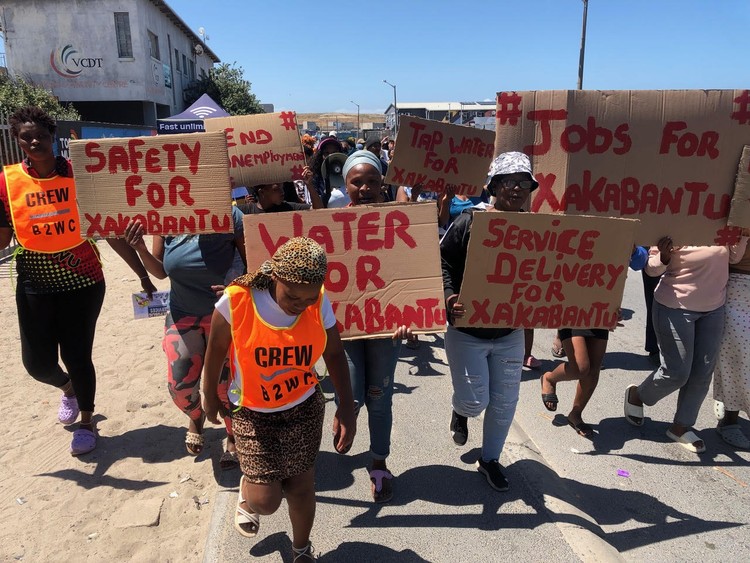Unemployed Capetonians march for jobs, safety and water
“I don’t see the point of filling out these [jobseekers’] forms anymore”
Residents of Xakabantu informal settlement in Vrygrond marched on Friday. Photo: Mary-Anne Gontsana
About 70 people marched up Vrygrond Avenue on Friday to highlight their need for jobs, safety, and basic services.
Under the Back To Work Campaign (B2WC), the protesters who were mostly from Xakabantu informal settlement, marched to the corner of Vrygrond Avenue and Prince George Drive.
Wendy Nitscki said she lost her job five years ago after temporarily losing the use of her legs. Since recovering, she has struggled to find work again.
“I am a 50-year-old woman. I know getting a job at this age is difficult, but I am willing to do any type of work, even if I sweep the street. We are a big family. None of us are employed, and we survive on my 75-year-old father’s pension and my sister’s disability grant,” said Nitscki.
Before the march, residents aired their grievances during a dialogue held at a community centre in Vrygrond.
Many residents at the dialogue filled out the City of Cape Town’s jobseekers’ forms that were being handed out to be added to the City’s database for when opportunities become available.
One resident said during the dialogue, “I don’t see the point of these forms anymore. I have lost count of how many of these forms I have filled out and submitted, but here I am still an unemployed mother of three.”
Some residents alleged that people were using bribes to get jobs.
In their memorandums, one addressed to Mayor Geordin Hill-Lewis and the other to the South African Police Service (SAPS), the residents say only a small fraction of the Vrygrond community are employed under the Expanded Public Works Programme (EPWP), and the EPWP does not provide job security because contracts are short term.
They also asked for a solution to the lack of water infrastructure in Xakabantu, where people currently depend on water truck deliveries. The residents also said the community was marred by gang violence and it had become worse since the Vrygrond Neighbourhood Watch stopped patrolling.
“We had a neighbourhood watch, however we could not sustain it because it was difficult for us to pay for it out of our pockets. As a community we request that SAPS give recognition to the Vrygrond Neighbourhood Watch and properly register it.”
The community has vowed to continue marching and protesting in the coming weeks until they are heard and acknowledged.
Support independent journalism
Donate using Payfast

Don't miss out on the latest news
We respect your privacy, and promise we won't spam you.
Next: Homegrown bicycle delivery service creates jobs for youth in Langa
Previous: Durban ward councillor’s mobile office overturned by angry residents
Letters
Dear Editor
The sight of Vrygrond residents marching to Parliament – a desperate procession demanding jobs, safety, and access to clean water – is a stark and unforgiving mirror held up to our society. This is not a march; it is a profound national shame.
That citizens in a democratic South Africa must physically present themselves at the legislative capital to beg for the absolute essentials of a dignified existence speaks volumes about the systemic breakdown of public duty. The reported 70% unemployment rate is not an accident of the market; it is the direct, cruel result of decades of structural neglect and political indifference that has suffocated opportunity and hope.
The crisis is compounded by the most basic of failures: the denial of clean, reliable running water. In a nation with the resources to govern, forcing people to live without this fundamental necessity – while also subjecting them to a constant threat of crime – is an unforgivable abdication of governmental responsibility. It demonstrates a callous disregard for the humanity of those who are most vulnerable.
The Vrygrond community’s demands are a piercing critique of a state that has failed to deliver the promises of freedom. The failure to ensure human security and provide access to basic resources is not merely a bureaucratic flaw; it is a deep-seated betrayal of the social contract that underpins our democracy.
We must stop treating these protests as isolated incidents and recognize them for what they are: symptoms of a colossal moral failure at the heart of our governance. Every step these residents took to Parliament represents a kilometre of distance between the rhetoric of equality and the devastating reality of life on the ground. Until we ensure that every person in every community has a chance to work and live safely with basic services, we are failing the very project of a just South Africa.
© 2025 GroundUp. This article is licensed under a Creative Commons Attribution-NoDerivatives 4.0 International License.
You may republish this article, so long as you credit the authors and GroundUp, and do not change the text. Please include a link back to the original article.
We put an invisible pixel in the article so that we can count traffic to republishers. All analytics tools are solely on our servers. We do not give our logs to any third party. Logs are deleted after two weeks. We do not use any IP address identifying information except to count regional traffic. We are solely interested in counting hits, not tracking users. If you republish, please do not delete the invisible pixel.

